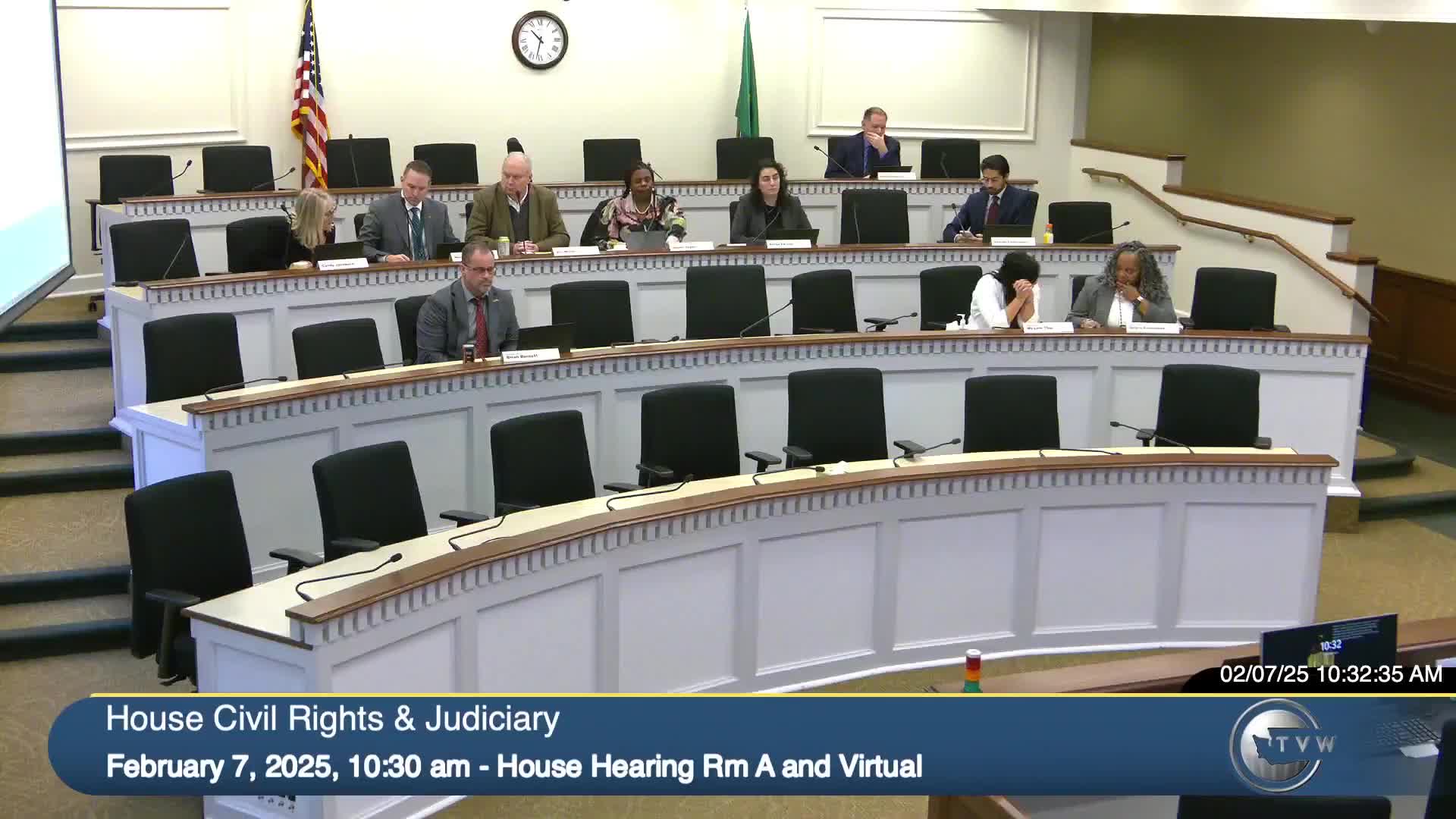Committee advances parenting-plan bill after debate on presumptions, standards and training
Get AI-powered insights, summaries, and transcripts
Subscribe
Summary
The Civil Rights & Judiciary Committee on Friday, Feb. 7, voted 10‑3 to report substitute House Bill 1620 out of committee with a due‑pass recommendation, advancing changes to how courts may limit residential time, decision‑making authority and dispute resolution in contested parenting‑plan cases.
The Civil Rights & Judiciary Committee on Friday, Feb. 7, voted 10‑3 to report substitute House Bill 1620 out of committee with a “do pass” recommendation, advancing legislation that revises limits courts may place in parenting plans and adds several presumptions and standards in contested cases.
The bill would change how judges consider limitations on residential time, decision‑making authority and dispute‑resolution processes in parenting disputes. Committee members debated four proposed amendments on drug‑related convictions, judicial discretion, the standard of proof when a parent or household member has a conviction for an offense against a child, and funding‑dependent training for judges.
Supporters and some stakeholders said the bill aims to provide clearer guidance for judges and more predictable outcomes for litigants; opponents, including some survivors and defenders of judicial discretion, said parts of the measure risk harming survivors or imposing problematic presumptions. Representative Taylor, chairing the committee, described broad stakeholder involvement including the Superior Court Judges Association, the Washington State Bar Association Family Law Executive Committee and survivor‑advocacy groups.
Key provisions adopted and rejected
• Amendment Adam 156 (adopted): The committee adopted an amendment that raises the standard of proof to “clear and convincing evidence” to rebut presumptions when a parent or a person the parent resides with has been convicted of an offense against a child. The amendment was supported by the Washington State Bar Association’s Family Law Executive Committee, according to committee remarks. (The transcript redacted the specific offense language as “*** offense against a child.”)
• Amendment Adam 155 (failed): An amendment by Representative Walsh that would have explicitly preserved broad judicial discretion in contested parenting cases failed on a voice vote. Walsh argued it struck a balance between calls to limit and calls to preserve discretion; opponents said the amendment would undermine the bill’s guardrails.
• Amendment Adam 153 (failed): Representative Jacobson moved an amendment establishing a rebuttable presumption that an adult conviction for certain Schedule I or II narcotic drug offenses poses a present danger to a child and would require courts to restrain contact unless the parent rebuts the presumption. Several members opposed the amendment, saying an isolated or remote conviction (for example, a youthful possession conviction) could be overly broad and that existing statutory standards addressing long‑term impairment already apply.
• Amendment Adam 154 (failed): An amendment from Representative Burnett would have required, subject to funding, the Administrative Office of the Courts (AOC) to develop trauma‑informed training for judicial officers, require newly elected and appointed judges to take the training, and require sitting judges to complete continuing education every three years. The committee discussed constitutional limits on mandating judicial training and noted AOC has previously provided training when funded; the amendment was not adopted on a voice vote.
Debate, votes and next steps
Vice Chair Farber moved the bill out of committee with a due‑pass recommendation. After debate the committee called the roll; the final vote to report substitute HB 1620 was 10 ayes, 3 nays (Representative Walsh, Representative Graham and Representative Jacobson). Staff announced the tally: “10 ayes, 3 nays, and 0 excused or absent votes.”
Representative Wallace (commenting in debate) and others said they supported moving the bill forward while continuing negotiations with stakeholders to refine the measure before floor action. Representative Wallen said she would vote to advance the bill while remaining “concerned” and committed to further work; Representative Graham announced a firm no vote, citing concerns about adequacy of protections for children and survivors.
Why it matters
The bill would alter family‑law decisionmaking statewide, adding specific presumptions and procedures that judges must consider in parenting plan disputes. Changes to presumptions around drug convictions and the required proof standard in cases involving convictions for offenses against a child could affect custodial arrangements, supervised contact orders and the burdens parents must meet to regain or retain parenting time. Proposals to require or fund judicial training raised constitutional and implementation questions about how to standardize practice across independently elected judges.
Quotes from the hearing
Representative Walsh: “So in the testimony we’ve heard...there’s a lot of concern about judicial discretion...this amendment says...judges still retain broad discretion in reaching what we hope are just and equitable conclusions.”
Representative Jacobson: “If someone has had an adult conviction of certain drug crimes...absent some sort of proof...we probably should not.”
Representative Burnett on training: “Let’s keep this trauma informed. Let’s do everything we can to bring the families back together and make it healthy for the children while protect them at the same time.”
What the committee recorded as actions
The committee recorded multiple formal actions on HB 1620, including motions to adopt or reject proposed amendments and a final motion to report the substitute bill out of committee with a due‑pass recommendation. The substitute bill moves next to the House floor for further consideration. No floor amendments or final enactment date were decided at the committee hearing.
Ending
Committee members emphasized ongoing negotiation with stakeholders should the bill advance. The transcript shows continued interest from both survivor‑advocacy groups and judicial stakeholders; members signaled intent to refine statutory language before floor debate.
